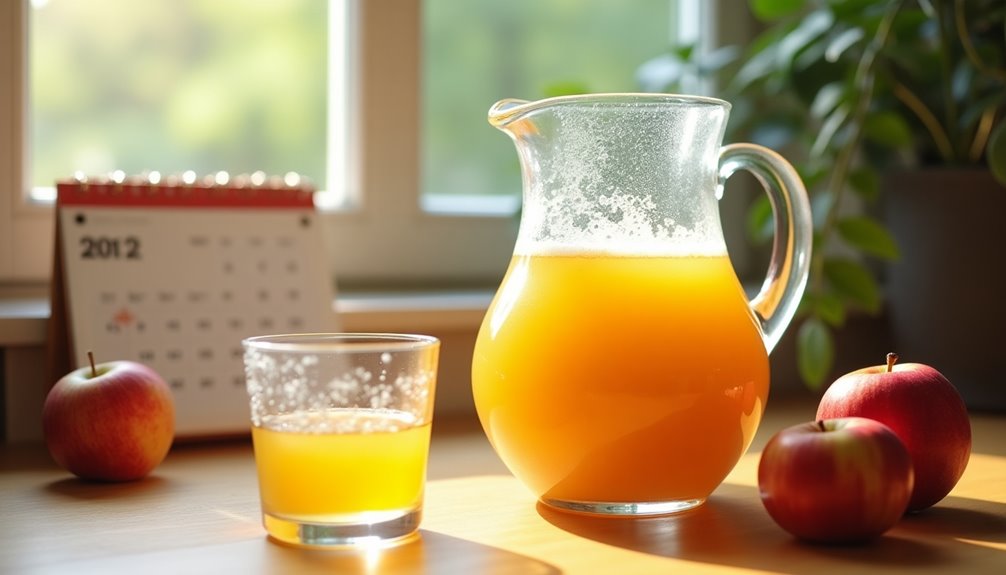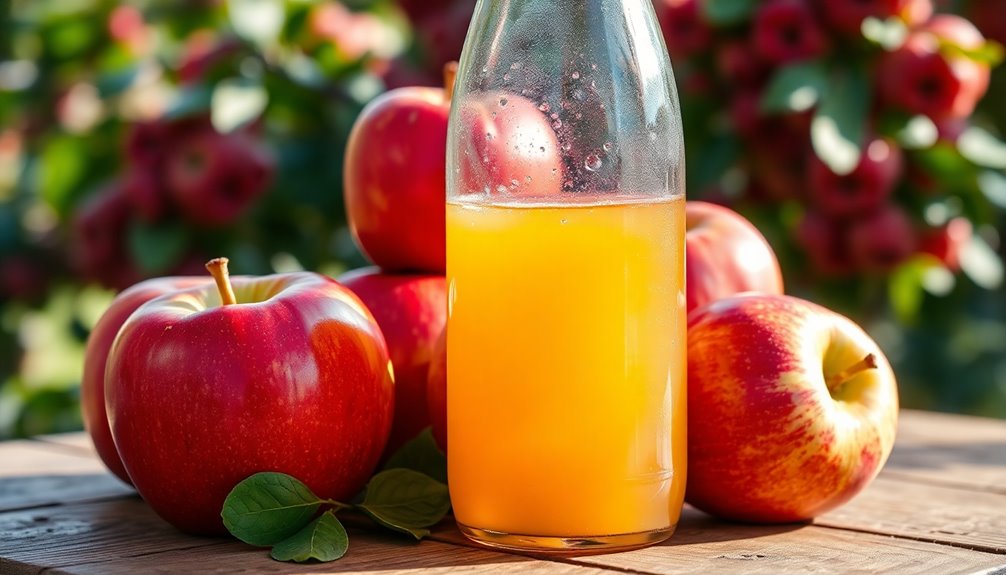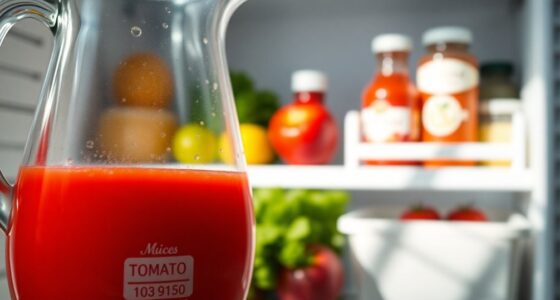Apple juice can last quite a while, depending on its form. Unopened juice stays fresh for 18 to 24 months, while opened juice should be consumed within 7 to 10 days when refrigerated. Freshly made juice is best enjoyed within 2 to 3 days. Canned juice has a shelf life of about a year unopened. If you freeze it, it can last 8 to 12 months. Want to know more about storage tips and spoilage signs?
Key Takeaways
- Unopened apple juice lasts 18 to 24 months at room temperature, depending on the expiration date.
- Opened apple juice should be consumed within 7 to 10 days when refrigerated.
- Freshly made apple juice is best consumed within 2 to 3 days due to lack of preservatives.
- Canned apple juice remains good for about a year if unopened, and should be used within a week once opened.
- Frozen apple juice can last between 8 to 12 months without significant quality loss if stored correctly.

Have you ever wondered how long apple juice really lasts? It's a common question, especially if you've got a half-full bottle sitting in your fridge. Knowing how long your juice stays fresh can help you avoid wasting food and money. The shelf life of apple juice varies depending on whether it's unopened or already opened, so let's break it down.
When it comes to unopened apple juice, you can expect it to last anywhere from 18 to 24 months at room temperature. This longevity largely depends on the expiration date printed on the label. If you keep it properly stored in a cool, dark place, you’ll maximize its lifespan. Additionally, once opened, apple juice should be consumed within 7 to 10 days if kept in the refrigerator to maintain its freshness and flavor. It’s interesting to note that different types of juice can have varying shelf lives, as seen in the effects of prune juice duration, which tends to have a shorter shelf life compared to apple juice. By understanding these timelines, you can make more informed decisions about your juice consumption and storage practices.
However, once you crack it open, things change. Opened store-bought apple juice usually lasts about 7 to 10 days in the refrigerator. After opening, it's essential to keep it tightly sealed to maintain its freshness. You can tell if opened apple juice is still safe to consume by looking for signs of spoilage, like an off smell or unusual color.
If you're enjoying freshly made apple juice, such as cold-pressed or homemade varieties, you need to consume them much quicker. Ideally, you should drink these within 2 to 3 days for optimal freshness. Since they don't contain preservatives like store-bought options, they're more susceptible to spoilage. Keep an eye out for any changes in taste or appearance; these juices can spoil faster than you might expect.
Canned apple juice offers a little more flexibility. If you haven't opened the can, it can last about a year, similar to unopened bottles. Once you open a can, though, it's best to use it within a week. Just like with other forms of apple juice, be careful to check for signs of spoilage before you take that first sip.
If you find yourself with an abundance of apple juice, freezing it might be your best bet. Frozen apple juice can last between 8 to 12 months while retaining its quality. Just make sure you store it at 0°F (-18°C) or lower. Even beyond this timeframe, if it's kept frozen, it's generally still safe to consume, although the taste and texture mightn't be the same.
Frequently Asked Questions
How Can You Tell if Apple Juice Has Gone Bad?
To tell if apple juice has gone bad, check for a sour smell or taste, which might indicate fermentation.
Look for a cloudy appearance or small bubbles, as these are signs of spoilage.
Mold growth is a clear red flag; toss it immediately if you see any.
Also, watch for darkening color and inspect the container for swelling, leaks, or rust.
If you notice any of these, it's best to avoid drinking it.
How Long Is Apple Juice Good for in the Fridge?
You'd think apple juice lasts forever, but it doesn't.
Once you open that carton, you've got about 10 days in the fridge if you store it right.
Canned juice? Aim for a week after cracking it open.
If it's been sitting out for more than 2 hours, toss it.
Homemade or cold-pressed juice? You're looking at just 48 hours.
Always seal it tightly to keep it fresh as long as possible!
How to Tell if Juice Has Gone Bad?
To tell if juice has gone bad, start by inspecting its appearance and smell.
If you see any cloudy liquid or notice a boozy odor, it's likely fermented. Mold on the surface is a clear sign of spoilage.
Also, if the juice tastes like vinegar or has darkened in color, it's best to toss it.
Pay attention to the container, too; if it's swollen or pops when opened, don't drink it.
Is It Okay to Drink Old Apple Juice?
Sure, you could drink old apple juice and embrace your inner daredevil, but it's not a great idea.
If that juice smells sour or looks like a science experiment gone wrong, you really shouldn't risk it. Your taste buds—and stomach—will thank you for checking for signs of spoilage.
Stick to fresh juice, and avoid the gamble of potentially unpleasant flavors or health scares.
Trust me, your future self will appreciate it!
Conclusion
In the end, whether you sip on that crisp, golden apple juice fresh from the fridge or discover a forgotten bottle lurking in the back, remember its lifespan. Like autumn leaves falling, it fades over time. If it's past its prime, you might catch a whiff of sourness instead of the sweet orchard aroma. So, enjoy your juice while it's vibrant and refreshing, just like the sun-kissed apples it's made from, and keep your taste buds happy!
Cindy thoroughly researches juicing trends, techniques, and recipes to provide readers with practical advice and inspiration. Her writing style is accessible, engaging, and designed to make complex concepts easy to understand. Cindy’s dedication to promoting the advantages of juicing shines through her work, empowering readers to make positive changes in their lives through the simple act of juicing.











